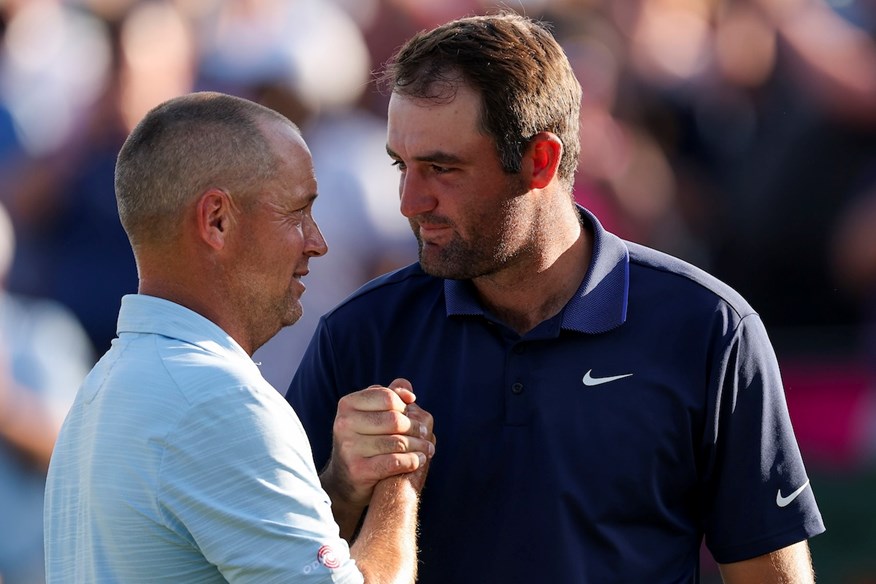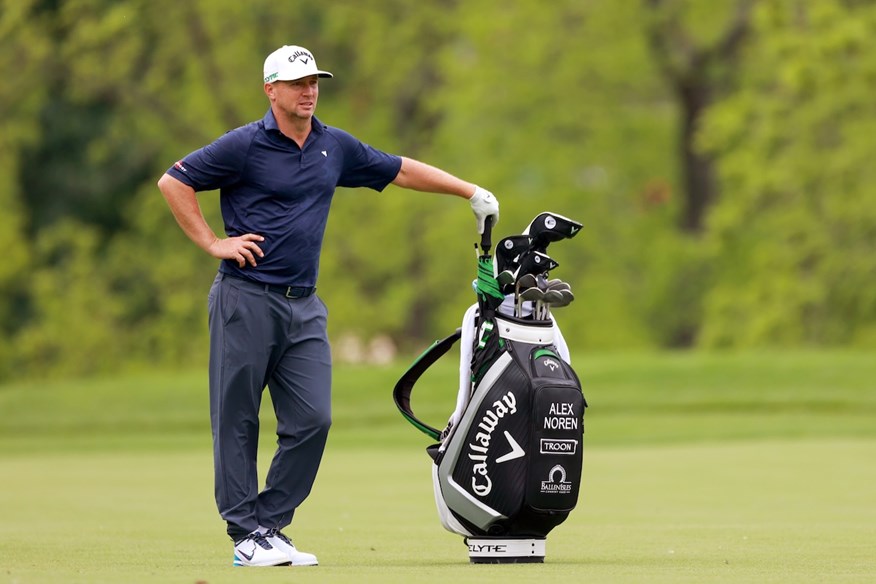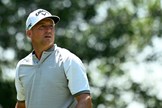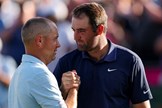Alex Noren: From PGA Tour imposter syndrome to starting again at 42
Last updated:
In just his second start back after a long injury absence, Alex Noren contended for the biggest title of his career at the PGA Championship alongside the best player in the world. The Swede spoke to Michael Catling about the mental gymnastics that dogged his final round, the imposter syndrome that followed him to America, and why he’s finally feeling optimistic for the future ahead of his return to Europe.
To make it as a professional golfer in a foreign country, you need to be driven, dedicated and disciplined. Staying there as a father and a forty-something takes some serious resolve and fortitude. Alex Noren, part of the 2018 Ryder Cup team, has never been lacking in that regard.
He’s made a career out of working harder than anyone on Tour – and has the pictures of the blisters and calluses on his hands to prove it. Now, in his eighth season on the PGA Tour, the Swede is back grafting again with a new way of thinking and training as he bids to secure a last-minute ticket to play in the Open Championship.
That search for consistency and confidence formed the basis of our chat as he reflects on the positives to come out of his recent injury layoff, as well as the realization that he’s still got a lot to learn and gain after coming up short at the PGA Championship…
I want to ask you about your hamstring injury because you described it as like being ‘shot in your backside’. What caused it?
I don’t really know. It was like a stress tear, like a 90 percent tear of one of the hamstring tendons attached to the sit bone. It was pretty bad because I couldn’t jump, I couldn’t run, I couldn’t swing a club. I couldn’t do much. I’ve got two kids, and they’re nine and six, so I got to spend seven months in a row with them, which is like a blessing in disguise from not having to work in the middle of the career.
Did it change your outlook on golf and how you go about things?
I guess it made me just appreciate the whole life, the family life, and not just the performance part of golfing. I started coaching my daughter’s softball team. I love all sports, so whatever my kids do, I try to play with them. So maybe what it gave me was just a fuller life.
Do you think that contributed to being in contention at the PGA Championship, playing carefree and knowing that your happiness doesn’t just depend on your golf? Was that the biggest takeaway that week?
Definitely. But I think the biggest lesson for me is that I’ve got to get a little better as a golfer. I wasn’t like super nervous, which is how I thought I was going to be, but I was more pissed off that I couldn’t hit enough greens [or] hit enough fairways. Some shots felt too difficult for me still as a golfer, so I would love to improve on those. Throughout my career, I’ve had a lot of ups and downs in terms of what feels and comes easily. Before, I felt like it was a little bit easier to hit good iron shots at all times. Now I kind of miss in the wrong spots.

What do you think is the root cause of that?
I think it comes from physical aspects, like I decreased my swing speed a little bit. I’ve been working mostly on one feel over the last year and a half, and even though it’s kept me playing pretty good overall, it’s decreased my swing speed a little bit. In 2015, ‘16, ’17, ‘18, I hit the ball a little longer and I could get up to a higher swing speed. Now, I feel like because my technique is off and on, I can’t seem to get the most out of the driver. And on a course like Quail Hollow where the holes are so long, if you can unlock that extra 20 yards it’s huge. I’m obviously not as big as Scheffler [in stature], but then neither is Rory so there’s no excuse for being smaller.
Is speed training a point of focus?
Well, I can’t really do it yet, since my leg is not fully recovered. It’s still early on. It’s like the doctor said, the best possible time to get back playing again was four months and I came back after four months and one week. But I’m going to work a lot more on improving perfect mechanics off the course. When I look back at swings from 2015, ‘16, ‘17 and ‘18, I swung it pretty good but I didn’t have other skills that I have now. I certainly didn’t have as much experience, so I’m looking forward to digging deeper on the technical side and doing the same with chipping and putting.
Does it frustrate or excite you when you assess the state of your game and the improvement needed to get over the line?
A bit of both. I’m just a little pissed off coming down the stretch at these tournaments, feeling like I don’t have what it takes to be up there [contending] more often. I would like to improve that. You know, I’m quite realistic. I look at some shots or some peoples’ speed and I can’t get to that. It pisses me off, but it also makes me excited for what I could do if I had it because I don’t think it’s too late to me.
I suppose you can take a lot of encouragement from the fact you were out for so long and still found yourself in the final group of a major championship without having your best stuff…
Of course, it’s very encouraging. Last season, I had a decent year, it was pretty steady. But when I look at each part of the game, I could do with some improvements. But I also feel a bit more relaxed now, maybe because I feel like I have a fuller life. So, it’s not like I focus all day and all night on golf. Before, golf ate most of my time.
Which is not always good thing…
No. And I wish I would have learned that earlier. I have quite an addictive personality when it comes to sport and improvement. I can see that when I’m coaching my daughter’s softball team, I get really into it, and I almost have to hold myself back and relax a little bit. It’s not necessarily about winning or losing, but when people improve or I improve, I see the enjoyment that brings. When my kids do like a back flip on a trampoline, and then they watch a YouTube clip of somebody doing it, and then they succeed after an hour or so, it’s like, ‘That’s what life’s about, isn’t it?’ Improvement and development.

So, after spending so long on the treatment table, has it changed your goals and schedule for this year?
I’m going to play as much as I can on, mostly on the American tour, and then in the fall play some more in Europe. I know I need to get going, having missed four months.
I really miss playing in Europe. I miss the people. I miss everything about it, so I would love to play in Europe more. And I know that the better I play here, the more I can play over there.
Out of all the major championships, you do seem best suited to The Open and your results reflect that. What is it about links golf that seems to suit your eye?
Well, I’m not in the British yet. But performance wise, that’s definitely my best major. I love links. My home in Sweden is kind of a links course called Vispy. It’s like a hybrid links; it’s tree-lined but it’s very windy and very firm. I’ve always loved that style so I don’t really need to prepare much for The Open. I need to prepare more for a US Open or PGA because it’s a little bit more foreign to me.
Is the Ryder Cup still in the back of your mind?
If I play well, then yes of course. But I’m pretty good at not thinking about stuff in the future. I’m pretty obsessed with the now and what it demands from me from a physical aspect.
Most people start winding down a little bit once they hit 40. Do you still feel capable of taking your game to another level?
I’m super optimistic, like the PGA was the most fun I’ve ever experienced on the golf course. I know what is needed to play well, so that’s why I’m more encouraged about the future. Before, it was like, ‘Will I ever be good enough to do this? Will I ever be good enough to do this?’ I never knew where I stood. Now I know more and I’m more excited which feels very good.
Alex Noren will tee up at this week’s Genesis Scottish Open, where the top three players who make the cut are otherwise not already exempt will qualify for The Open at Royal Portrush.



